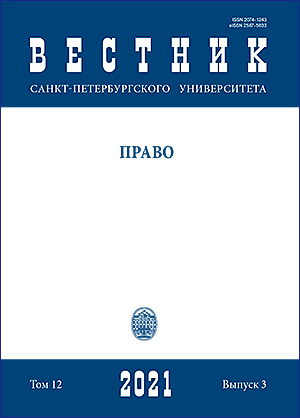Оплата юридических услуг в гражданском процессе США: гонорар успеха, американское правило и их влияние на судебную нагрузку
DOI:
https://doi.org/10.21638/spbu14.2021.313Аннотация
В статье исследуется механизм влияния гонорара успеха и американского правила на количество обращений в судебную систему США и, следовательно, на судебную нагрузку в целом. В настоящий момент не сложилось единого представления о роли гонорара успеха и американского правила в процессе роста количества обращений в суды, усматривается противодействие двух противоположных взглядов на этот вопрос: тех, кто смотрит на ситуацию со стороны истца (а значит, выступает за гонорар успеха и американское правило), и тех, кто видит проблему со стороны ответчика (а значит, высказывается против указанных институтов). Гонорар успеха и американское правило дополняют друг друга. Гонорар успеха оправдывает свое существование тем, что расширяет доступность правосудия, с его помощью лица, не способные оплатить услуги юриста, получают возможность обратиться в суд. Кроме того, истец уверен в том, что даже в случае проигрыша ему не придется оплачивать расходы ответчика. В итоге гонорар успеха и американское правило позволяют обеспечить реализацию одной из незыблемых ценностей — права каждого американца на «день в суде» (a day in court). В то же время множество фактов свидетельствует о том, что связка из гонорара успеха и американского правила привела к росту количества явно необоснованных, «пустячных», «досаждающих» исков, которые предъявляются не с целью получения положительного судебного решения, а лишь с тем, чтобы склонить ответчика к заключению соглашения о выплате истцу отступного.
Ключевые слова:
американский гражданский процесс, американский кризис судопроизводства, судебные расходы, расходы на представителя, гонорар успеха, компенсация расходов на представителя, американское правило
Скачивания
Библиографические ссылки
Загрузки
Опубликован
Как цитировать
Выпуск
Раздел
Лицензия
Статьи журнала «Вестник Санкт-Петербургского университета. Право» находятся в открытом доступе и распространяются в соответствии с условиями Лицензионного Договора с Санкт-Петербургским государственным университетом, который бесплатно предоставляет авторам неограниченное распространение и самостоятельное архивирование.






